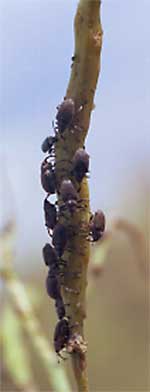Edmonton, Alberta, Canada
July 16, 2009
New canola strain takes the
'evil' out of 'weevil'
 A
canola seed has been bred to resist the cabbage seedpod weevil. A
canola seed has been bred to resist the cabbage seedpod weevil.
A strain of canola that could save farmers millions of dollars
per year in crop losses and insecticide costs has been developed
in part by a University of
Alberta (U of A) researcher.
A canola seed bred to resist the cabbage seedpod weevil - a
major threat to canola crops in Western Canada - has been
developed by Lloyd Dosdall, a professor of agricultural
entomology at the U of A, and a researcher at the University of
Guelph.
The weevil, which devours seeds inside the pods of the plant, is
an ongoing threat to production in southern Alberta and southern
Saskatchewan and is spreading north and east at a rate of 50
kilometres per year. Annual crop losses and insecticide costs to
protect against the pest reach into the millions of dollars,
said Dosdall.
Canola crops contribute up to $2 billion annually to Alberta's
economy alone.
To develop a seed that could withstand the weevil, Dosdall and
his colleague developed a hybrid using the white mustard plant,
which has natural resistance to the pest, and is a close cousin
to canola. "The result is a canola plant that maintains its
quality and vigour, and now has the genetic ability to resist
the weevil," he noted.
The discovery will allow farmers to ease the use of pesticide on
their canola, and may prevent crop losses by as much as 25 per
cent, Dosdall added.
The new strain of canola is expected to be commercially
available to farmers by 2010.
Dosdall has been working on this and related research for 20
years, with the overall aim of finding ways to control insect
pests with minimal economic and environmental impact.
by Bev Betkowski
This article originally appeared in the University of Alberta's
ExpressNews |
|